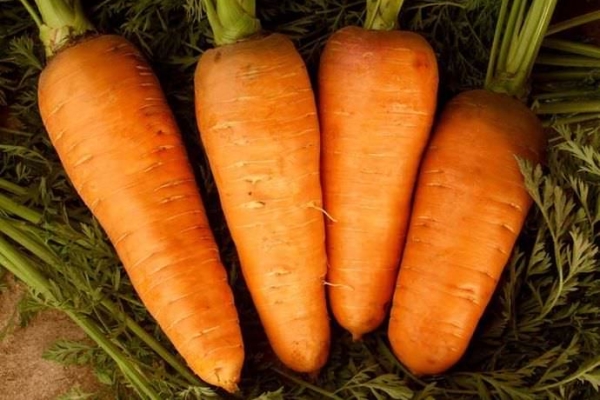Carrots are one of the favorite root vegetables.. Therefore, every self-respecting gardener, be sure to allocate a garden for this vegetable. Shantane variety is popular for its taste, high yield and simple care.
Table of contents
Features, description and characteristics of the variety Shantane
Homeland of this variety - France. For several years, French breeders have crossed the best varieties growing on the territory of the state. The result was a wonderful hybrid - a sort of Chantonne.
In Russia, carrots were introduced in 1943, subsequently entering the top ten of the most widely used varieties for growing.
According to the description, the root vegetable has a typical orange color and a perfect conical shape. The tip and head of the fetus are rounded.
Standard length ranges from 10 to 15 centimeters. The plant is bright green and sprawling.
Kuroda Shantane's flesh is thick, but very juicy and sweet.The rod is almost not noticeable. The average weight of the fetus ranges from 150 to 200 grams.
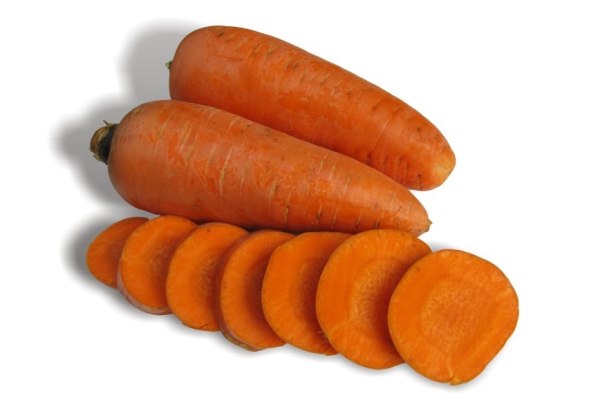
In breeding, the concept of a type is present - it unites various plants with the same genotype, the main characteristic features that are close to each other.
According to this definition Shantane variety includes early-ripening varieties, mid-ripening varieties, F1 hybrids.
Due to this diversity, this variety can be grown throughout Russia, with different soils and climatic features.
In the middle lane, in the presence of a greenhouse, it is possible to harvest two crops of early ripe root crops.
Subject to the relevant agricultural practices Shantane gives a high yield - up to 10 kilograms per square meter.
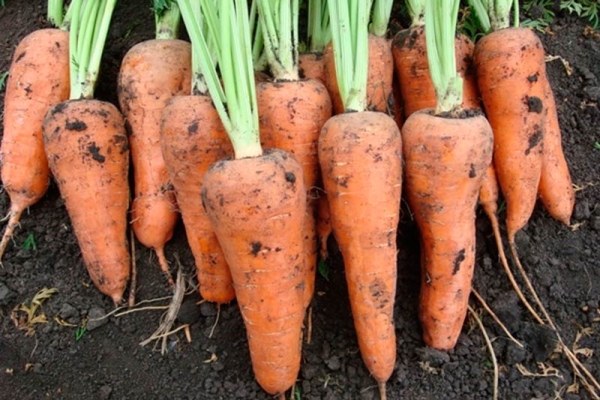
Advantages and disadvantages of carrots Shantane
The variety is very popular in Russia. Breeders are engaged in continuous improvement of the main characteristics.
Carrots are useful in any form: fresh, grilled, boiled or fry. In the processed product fewer nutrients will remain, but it is better absorbed by the body.
This indicates that This variety has more advantages than disadvantages:
- Versatility. The plant is perfect for fresh consumption, freezing, getting juice, canning and cooking various hot dishes and salads.
- High yield.
- No tendency to fork.
- The root crop in the ground does not crack and does not deteriorate.
- Juicy sweet taste.The sugar content in some instances exceeds 10%.
- Unpretentiousness. This variety does not require daily attention and careful maintenance.
- Resistance to a large group of diseases.
- The possibility of growing in different climatic conditions, different soils.
- The shelf life of more than 8 months.
- Good transportability.
Amateur gardeners and professional gardeners did not find a single drawback in this variety.
Carrots are rich in V-carotene. It is this root vegetable that gave the vitamin this name, as in Latin “carota” means carrot.
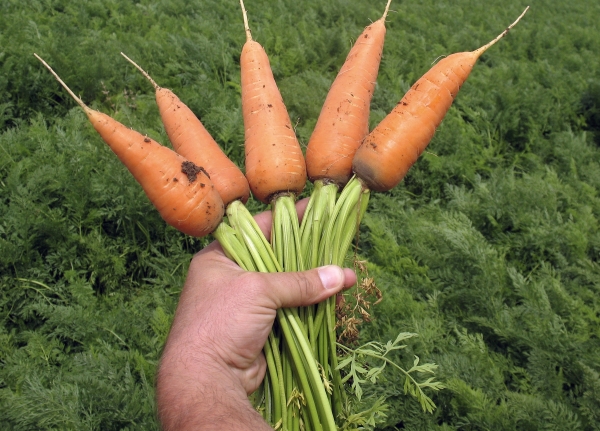
Landing tips
Soil requirements
If the gardener is used to growing carrots, he knows that the greatest yield can be obtained on a loose, well-broken garden bed, open to the sun.
Shantane is no different from its fellows, therefore nutritious soil with good air circulation will allow you to harvest a good crop of this root.
Shantane variety is well adapted to any growing conditions.therefore, it tolerates both low and high temperatures and heavy ground well.
Despite the simplicity, the best for Shantane is loamy and light sandy soil. If humus is present in the soil, this will have a beneficial effect on the growth of the root crop.
Carrot does not tolerate sour soilas its resistance to various diseases decreases. The more acidic the soil, the less chance of a healthy crop.
Carrots can be planted in the same place 4 years after the last harvest of this root.
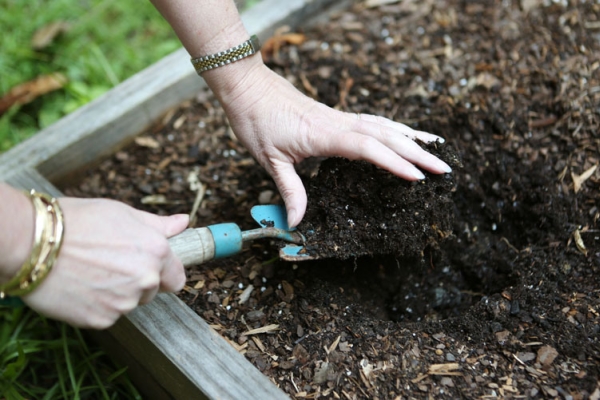
Sowing rules
Shantane variety allows you to harvest two harvests per season. Therefore, if a gardener wants to get a “summer” carrot, the seeds are planted before winter or in early spring.
therefore better to land in spring immediately after the top layer of soil thaws and warms slightly.This option of planting a plant is suitable when it is planned to be eaten, not stored.
Carrot is a biennial plant.. In the second year, she releases the seed hand.
For winter storage, the seeds are planted in mid-May, when the average air temperature is set at 15-18 degrees.
Before planting, seeds should be poured with warm water and left for 10-12 hours to swell. Seeds suitable for sowing will remain at the bottom of the tank, floating on the surface, should be discarded, from them nothing will grow.
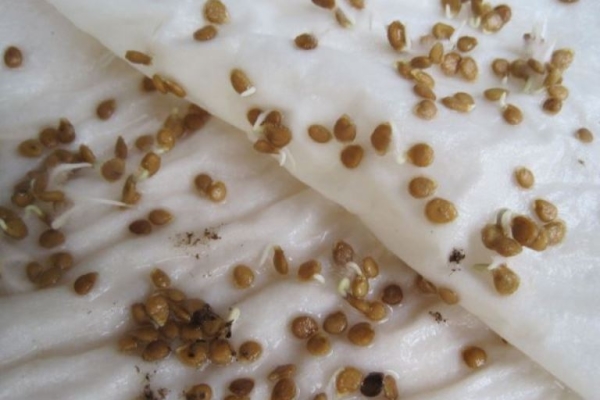
In order to accelerate germination, you can spread the seeds on a damp cloth for several days before the date of landing in the ground, and make sure that the air temperature in the room does not fall below 20 degrees.
The entire waiting period, the fabric is moistened with warm water. The first small roots will appear in three to four days.
The bed should be well dug, without lumps. On it grooves are made up to 3 centimeters deep, which are carefully shed with water.
If you drink carrot juice every day or eat more than one vegetable, your skin will turn yellow.
Even the swollen seeds of a plant are very small. When disembarking you should try not to damage the small processes. To make it easier to separate from each other, pour seeds with starch. It is convenient to take them with the help of tweezers with a soft tip.
Planting in this way is a very painstaking process, but as a result, there will be no need for regular thinning of rows, which damages the plants remaining in the garden.
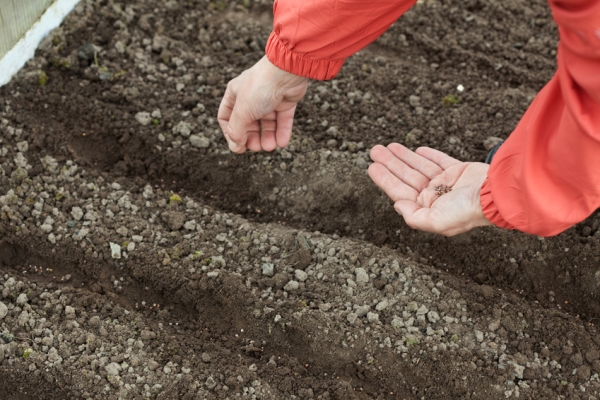
How to care
The main care of the plant is:
- frequent loosening of the soil;
- weed control;
- thinning;
- top dressing;
- watering.
For a juicy, sweet harvest it is necessary to ensure uniform watering. It is made using a watering can or a hose with a spray.
Young shoots are watered 1-2 times a week, then no more than 1 time. When the root is formed enough to water 3 times a month at the rate of 10 liters of water per square meter.
To ensure good storage of carrots, Watering should be stopped at least 20 days before harvest..
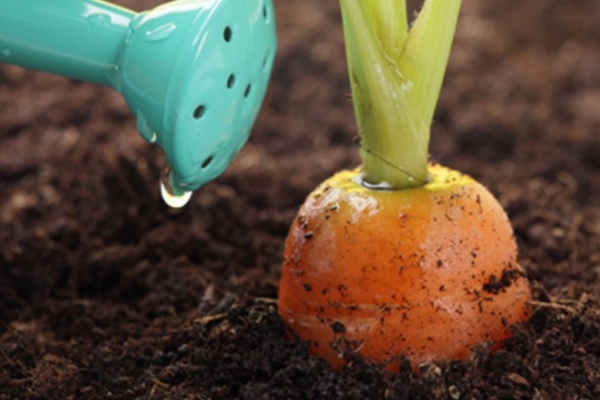
Feeding is carried out as follows:
- 25-30 days after the appearance of the first plants with a solution of nitrophoska at the rate of 5 liters per square meter;
- 20 days after the first feeding with the use of potash and phosphate compounds.
Weeds are removed as they appear. Loosen the soil often avoid crust formation.
Cultivation and care errors
The main errors in the care of seedlings include:
- no weeding. As a result, the plant will be thin and will not give a good harvest;
- rare watering. This will affect the taste of the root and its pulp, which will become "wooden";
- frequent watering. The root crop is cracked and poorly stored.
In 1991, carrots were recognized as fruit. It is recorded in the European Union with the light of the Portuguese, who make it a surprisingly delicious jam.
Disease and Prevention
Shantane variety resistant to most known diseases. If adverse conditions are created, the root can be infected with infections and fungal diseases.They spoil its appearance and taste and do not allow further storage.
Basic preventive measures:
- disinfection of seeds before planting (treatment with a weak solution of manganese, aging for 3-4 hours at a temperature of 45-50 degrees);
- selection of the correct site (the place should be well sanctified by the sun, groundwater should not be near, moderate acidity of the soil, respect for the four-year period between the carrot planting in the same place).
Carrot biennial plant. In the first year of its existence, it is not exposed to infection by diseases. Except for periods of common epidemics.
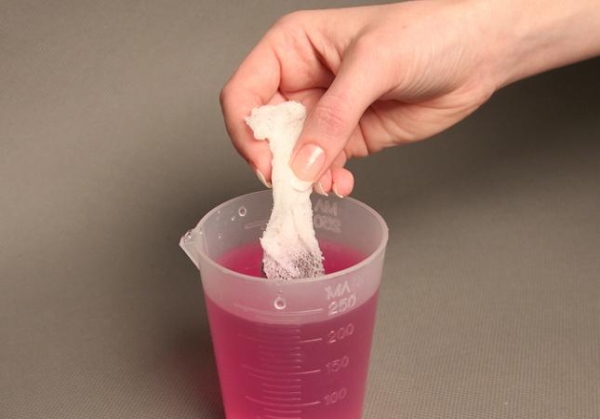
Harvesting and storage
To be stored carrots planted in late spring. Her collection is from September to mid-October.
Ideally, during this period the weather is dry, as the root-saturated root is stored worse.
Shantane variety is beautifully stored in wooden or plastic boxes, nets.Boxes must have air vents.
The ideal storage place is an appropriately equipped cellar.. The storage room should be cool, otherwise the carrots will become lethargic and not tasty.
In carrots edible not only the roots, but also greens. It can be added to soup or salad instead of parsley or dill.
Everyone, even the most inexperienced gardener, can provide himself with a stock of carrots of the Shantane variety for the whole winter. The variety is very unpretentious and high yielded..
And on condition of landing twice a season, the result will exceed all possible expectations.
